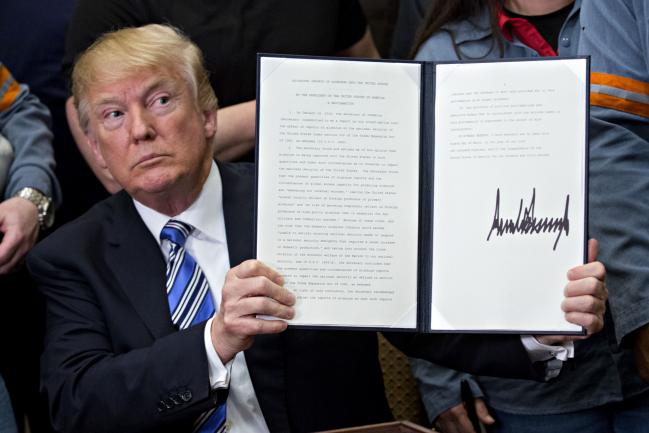(Bloomberg) -- Treasury Secretary Steven Mnuchin said the U.S. wants to negotiate exemptions for steel and aluminum tariffs before they take effect in two weeks, as pressure grows from allies who are threatening retaliation if the duties are applied to them.
“Ideally, some of them will be dealt with in this 15-day process so that they don’t hit those countries,” Mnuchin said Friday, citing the legal time-frame for implementing the tariffs.
“I’m not saying every single one will be dealt with,” Mnuchin said in response to questions from reporters in New York.
Trump announced on Thursday that he’s slapping a 25 percent tariff on steel imports and 10 percent on aluminum. He excluded Mexico and Canada, as long as they negotiate a new North American Free Trade Agreement, and threw the door open to further exclusions for countries and niche products.
Allies from the European Union to Australia and Japan have said they’ll seek exemptions and dismissed the national security concerns that the U.S. invoked to justify the tariffs.
The U.S. Commerce Department is due to release regulations for the tariffs within 10 days. Mnuchin said that the secretary of commerce is entitled to issue waivers for specific products, while only the president can exempt entire nations.
There remains a risk of backlash from allies who seek exemptions and don’t get them.
Trump’s official proclamations say that “any country with which we have a security relationship” is invited to discuss “alternative ways” to address the security risks of steel and aluminum imports, a process that could lead to other countries being excluded. U.S. trade chief Robert Lighthizer will be in charge of working out deals with other partners.
European Union trade chief Cecilia Malmstrom vowed to press for an EU exemption when she meets Lighthizer in Brussels on Saturday.
“Europe is certainly not a threat to American internal security, so we expect to be excluded,” Malmstrom, the 28-nation EU’s trade commissioner, told reporters in Brussels on Friday.
America’s friends deserve “flexibility and cooperation” when the measures are imposed, Trump said Thursday at the signing ceremony.
To read more about how businesses will seek exemptions, click here.
“We suspect many countries will argue against tariffs before the enforcement date, but those that don’t receive exemptions will respond with retaliatory measures,” Oxford Economics said in a note. “The key risk is that this then pushes the U.S. to escalate tensions and counter-retaliate outside of World Trade Organization supervision.’
Exempting some nations marks a compromise from Trump’s initial plan for across-the-board tariffs, which was harshly criticized by members of his own Republican party who said it would cost U.S. jobs, raise consumer prices and hit American manufacturers. Trading partners including the EU threatened retaliation, triggering fears of a trade war.
China was quick to respond to Trump’s announcement. The Ministry of Commerce said in a statement Friday that China will take “strong measures’ to protect its own interests and warned the U.S. government’s actions will “seriously shake” the global trade order.
The U.S. says China is the main culprit in flooding the market with cheap steel and aluminum, dragging down prices and putting American producers out of business. While China accounts for just a small portion of U.S. imports, the Trump administration has said it diverts its shipments of the metals through other countries on the way to the U.S.
“The reality is that the real friends are going to be those who are willing to partner with us on national security issues and also look to make sure there is free and fair and reciprocal trade,” White House Legislative Affairs Director Marc Short said in an interview on Bloomberg TV on Friday. “We want to make sure that for those who are looking to take advantage of American markets that we have the same opportunities in their markets.”
Trump’s authority to establish the tariffs stems from a Commerce Department investigation that found that imports of the metals pose a risk to national security. The probes were authorized under the seldom-used Section 232 of the 1962 Trade Expansion Act, which gives the president broad powers to impose trade restrictions on domestic security grounds.
